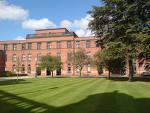James Gibbs Blake 1833 - 1900
November 12, 2009
 James
Gibbs Blake 1833 - 1900 BA,
MD,
MB
1854,
MB
1856,
winner of a
1854
and
1856
Gold Medal Award from University College Medical
College,
was an orthodox physician who converted to homeopathy to become the
Physician
at the Taunton Homeopathic
Dispensary, the
Wolverhampton Homeopathic
Dispensary,
Physician
at the Birmingham Homeopathic
Hospital,
the
Editor
of the Monthly Homeopathic
Review,
member
of the Northern Homeopathic Medical
Association,
member
of the British Homeopathic
Society,
General
Secretary
to the British Homeopathic Congress in 1882, Vice
President
of the Midland Homeopathic
Society,
Chair
of the Midland Chemists Association,
member
of the Royal Sanitary Institute.
James
Gibbs Blake 1833 - 1900 BA,
MD,
MB
1854,
MB
1856,
winner of a
1854
and
1856
Gold Medal Award from University College Medical
College,
was an orthodox physician who converted to homeopathy to become the
Physician
at the Taunton Homeopathic
Dispensary, the
Wolverhampton Homeopathic
Dispensary,
Physician
at the Birmingham Homeopathic
Hospital,
the
Editor
of the Monthly Homeopathic
Review,
member
of the Northern Homeopathic Medical
Association,
member
of the British Homeopathic
Society,
General
Secretary
to the British Homeopathic Congress in 1882, Vice
President
of the Midland Homeopathic
Society,
Chair
of the Midland Chemists Association,
member
of the Royal Sanitary Institute.
James Gibbs Blake was a Secretary (Anon, The Homeopathic World, Volume 43, (1908). Page 236) of the 2nd International Homeopathic Congress held in London (Anon, The Medical Counselor, Volume 7, (The Michigan State Homeopathic Society, 1883). Page 347) in on 11th-18th July 1881 (Anon, The Homeopathic World, (August 1,1881)) at Aberdeen House, Argyll Street, Regent Street.
James
Gibbs Blake (*photo used courtesy of Homéopathe
International by Sylvain
Cazalet at PHOTOTHÈQUE
HOMÉOPATHIQUE) was the
homeopathic practitioner and Trustee of the Sir Josiah Mason
Orphanage
alongside Edward Wynne
Thomas, and he
was also the
President,
Chairman of the
Trustee
and the Chairman of the
Council
of the Mason Science
College in
Birmingham, and a Co
Founder
and Vice
President
of the University of
Birmingham. James
Gibbs Blake was the homeopathic
physician
of Josiah
Mason,
and he practiced in
Birmingham,
at 24 Colmore
Road,
24 Bennetts
Hill,
and 23 Waterloo
Street.
From http://www.jquarter.org.uk/webdisk/morejmason.htm As you might imagine, Josiah Mason became extremely wealthy and in the 1850s he turned his thoughts to philanthropy. In 1858 he opened almshouses in Station Road, Erdington, Birmingham, for spinsters and widows over 50 and orphan girls, providing accommodation in furnished rooms 14ft x 11ft with coal, gas and a small annual income provided.
These premises proving inadequate to the purpose, in 1869 a second, larger orphanage was opened in Bell Lane (now Orphanage Road), Erdington, with rooms for 26 women and dormitories for 300 children. (The health of the children is placed under the care of two homeopathic practitioners James Gibbs Blake (trustee) and Edward Wynne Thomas).
On 4.12.1856, James Gibbs Blake of Taunton, Somerset, passed his Apothecaries examinations,
On 12.12.1870, James Gibbs Blake, Josiah Mason and George James Johnson executed the Foundation Deed of the University of Birmingham:
On February 23, 1875, Josiah Mason, the Birmingham industrialist and philanthropist, who made his fortune in making key rings, pens, pen nibs and electroplating, founded Mason Science College. It was this institution that would eventually form the nucleus of the University of Birmingham.
In 1882, the Departments of Chemistry, Botany and Physiology were transferred to Josiah Mason Science College, soon followed by the Departments of Physics and Comparative Anatomy.
The transfer of the Medical School to Mason Science College gave considerable impetus to the growing importance of that college and in 1896 a move to incorporate it as a university college was made.
As the result of the Mason University College Act 1897 it became incorporated as Mason University College on January 1, 1898, with the Right Honourable Joseph Chamberlain MP becoming the President of its Court of Governors.
Gibbs Blake’s Obituary is in The British Homeopathic Review, Volume 44 in 1990,
Gibbs Blake submitted papers to the House of Commons, and he submitted many cases and articles to various homeopathic publications, including Parasitic Disease: tape worm and trichonoe, and he wrote A lecture addressed to the medical profession … on The place of the law of similars in the practice of medicine,
Of interest:
James Edward Huxley Blake MD, Church Canon, son of James Gibbs Blake, was the first student to register at the Mason Science College, who subsequently graduated BA from the University of Birmingham, and he was a member of the Society of Antiquaries of London, and he wrote Gravestones in Midland Churchyards for the Birmingham Archaeological Society,
From http://en.wikipedia.org/wiki/Mason_Science_College Mason Science College was founded by Josiah Mason in 1875 (1870), the buildings of which were opened in Edmund Street, Birmingham, England on 1 October 1880. In 1900, it was incorporated into the new University of Birmingham.
Notable alumni include:
- Arthur Neville Chamberlain, British Prime Minister.
- Stanley Baldwin, British Prime Minister.
- Sir Henry Fowler, locomotive engineer.
- C.W. Hobley, pioneering colonial administrator in Kenya.
- Constance Naden, Poet & Philosopher.